whose,,of,whom与of,which的用法和区别
汇总逗号后用who还是whom

逗号后用who 还是whom定语从句【知识简介】名词或代词由一个从句来修饰,该从句即定语从句。
定语从句一般后置,但as引导的修饰全句的定语从句可以前置(倒装)。
引导定语从句的词有关系代词that, which, who, whom, whose, as等以及关系副词when, where, why等。
关系代词或关系副词放在被修饰的名词或代词(又叫做先行词)和定语从句之间起联系作用,同时又作定语从句中的一个成份。
【要点难点】1)that和which的用法区别只用that的情况:①先行词由最高级修饰时,如the best work that I can do。
②先行词由序数词修饰时,如the second book that I bought。
③先行词由the last, the only, the same, the very等修饰时。
④先行词是不定代词all, anything, everything, little, much, nobody, nothing等时,如anything that he does; all that I can do now等。
⑤先行词有any, no, all等限定词时,如all the words that I have learned。
⑥先行词为词组,该词组既含人又含物时,如the city and the people that I visited。
只用which的情况:①在非限定性定语从句中(定语从句前有逗号)。
②介词后。
请看that和which的使用例句:(1)It is the best film that’s has ever been made on the subject of madness. 这是以精神病为题材而拍摄的影片中最好的一段。
(2)Shakespeare is the greatest poet that England has ever had. 莎士比亚是英国最伟大的诗人(3)He is the last person that one would suspect. 人们最不可能怀疑他。
定语从句关系代词which,who,whom,whose的用法[优质PPT]
![定语从句关系代词which,who,whom,whose的用法[优质PPT]](https://img.taocdn.com/s3/m/e61627895901020206409c85.png)
关系代词which/who/whom/whose的用法
版本:各地通用 年级:初通用
定语从句中的关系代词有哪些?
which/ who/ whom/whose/ that/ as
掌握要领 1. 先行词为sb or sth? 2. 先行词在从句中做何成分?
1.Do you know the man who is talking with your mother?
回顾归纳
关系代词 which who whom whose
指代 物 人 人 人,物
在从句中的成分 主语,宾语,表语 主语,宾语,表语 宾语 定语
注意事项
当先行词在限制性定语从句中做宾语时,关系代词 常常可以省略。
The boy (whom) she loved died in the war
The trees (which ) we planted last year are growing fine. 但在非限制性定语从句时,不省略 My house, which I bought last year, has got a lovely garden.
( 先行词为 My house, 指物;宾语)
Tip 2: 先行词为指物的名词或代词时,无论其在从句中做 主语或宾语,均用which做连接词。
掌握要领 1. 先行词为sb or sth? 2. 先行词在从句中做何成分?
5. I like those books whose topics are about history.
our class.
4. I feel sorry fபைடு நூலகம்r the famous peoplew__h_o_ live their lives in
whose的用法句型
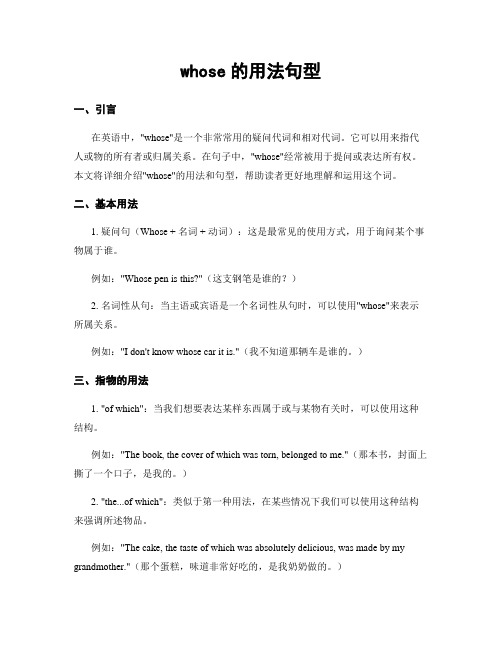
whose的用法句型一、引言在英语中,"whose"是一个非常常用的疑问代词和相对代词。
它可以用来指代人或物的所有者或归属关系。
在句子中,"whose"经常被用于提问或表达所有权。
本文将详细介绍"whose"的用法和句型,帮助读者更好地理解和运用这个词。
二、基本用法1. 疑问句(Whose + 名词 + 动词):这是最常见的使用方式,用于询问某个事物属于谁。
例如:"Whose pen is this?"(这支钢笔是谁的?)2. 名词性从句:当主语或宾语是一个名词性从句时,可以使用"whose"来表示所属关系。
例如:"I don't know whose car it is."(我不知道那辆车是谁的。
)三、指物的用法1. "of which":当我们想要表达某样东西属于或与某物有关时,可以使用这种结构。
例如:"The book, the cover of which was torn, belonged to me."(那本书,封面上撕了一个口子,是我的。
)2. "the...of which":类似于第一种用法,在某些情况下我们可以使用这种结构来强调所述物品。
例如:"The cake, the taste of which was absolutely delicious, was made by my grandmother."(那个蛋糕,味道非常好吃的,是我奶奶做的。
)四、指人的用法1. "of whom":当我们想要表达某事属于或与某人有关时,可以使用这种结构。
例如:"I met a woman yesterday, the sister of whom is a famous actress."(昨天我遇到了一个女人,她姐姐是一位著名演员。
定语从句语法规则
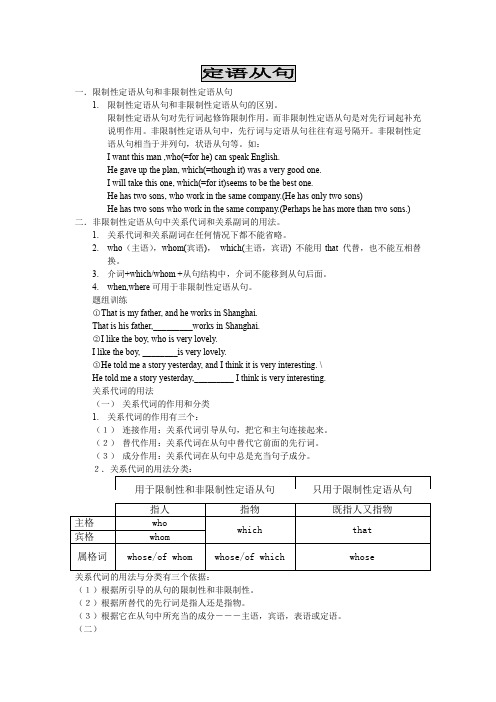
一.限制性定语从句和非限制性定语从句1.限制性定语从句和非限制性定语从句的区别。
限制性定语从句对先行词起修饰限制作用。
而非限制性定语从句是对先行词起补充说明作用。
非限制性定语从句中,先行词与定语从句往往有逗号隔开。
非限制性定语从句相当于并列句,状语从句等。
如:I want this man ,who(=for he) can speak English.He gave up the plan, which(=though it) was a very good one.I will take this one, which(=for it)seems to be the best one.He has two sons, who work in the same company.(He has only two sons)He has two sons who work in the same company.(Perhaps he has more than two sons.) 二.非限制性定语从句中关系代词和关系副词的用法。
1.关系代词和关系副词在任何情况下都不能省略。
2.who(主语),whom(宾语),which(主语,宾语) 不能用that 代替,也不能互相替换。
3.介词+which/whom +从句结构中,介词不能移到从句后面。
4.when,where可用于非限制性定语从句。
题组训练○1That is my father, and he works in Shanghai.That is his father,_________works in Shanghai.○2I like the boy, who is very lovely.I like the boy, ________is very lovely.○3He told me a story yesterday, and I think it is very interesting. \He told me a story yesterday,_________ I think is very interesting.关系代词的用法(一)关系代词的作用和分类1.关系代词的作用有三个:(1)连接作用:关系代词引导从句,把它和主句连接起来。
定语从句which的例子

定语从句which的例子定语从句which的例子which可以指代地点也可以是时间,下面要为大家分享的就是定语从句which的例子,希望你会喜欢!inwhich的用法which 用于定语从句,作关系代词,在句中要做成分in which 用于定语从句,作关系副词,在句中不做成分,in which=wherein which 只搜索能用在定语从句中,等于where,在定语从句中作状语。
如:He lived in the house in which Tom once lived.He lived in the house where Tom once lived.定语从句中.如this is the room in which we stayed先行词是room,后的句子是用来修饰room的但是room不可做stay的成分,因为stay是不及物动词,后不可直接家宾语所以要有个介词.其实上述的句子=this is the room which we stayed in.这里的介词是可以提到which 前的定语从句in_which等的.用法in which, for which, on which, atwhich的不同用法这些都是定语从句里面,由which引导的定语从句,介词提前。
in which可以翻译成在……里面for which可以翻译成为了……目的on which可以翻译成在……的上面,或具体时间的某一天at which可以翻译成在……里面或在……上面这些介词的使用除了意思上的区别,具体是要以which引导的从句而定的。
例如:(1) The school (that/which) he once studied in is very famous.= The school in which he once studied is very famous.(2) Tomorrow I will bring here a magazine (that/which) you asked for.= Tomorrow I will bring here a magazine for which you asked.(3) I have a dresser in my bedroom, which there are many cosmetics on.= I have a dresser in my bedroom on which there are many cosmetics.(4)The dumpling House which he often has dumplings at is very popular.= The dumpling House is very popular, at which he often has dumplings.当然这只是介词作为基本意思的用法,还有一些固定搭配,得具体情况具体分析。
2020年高考英语之高频考点解密十 定语从句(含答案)

解密10定语从句考点详解【考点解读】定语从句的用法较为复杂,高考除了单独考查定语从句知识外,还常常结合句式结构、时态等来综合考查。
纵观近几年各地高考试题,不难发现其考点主要包括:1. 考查关系代词和关系副词的区分。
如: that, which和where, when的区分; that, which和why的区分等。
2. 考查whose的使用。
whose可以指代人或物, 在定语从句中作定语, 后跟名词。
指物时, whose+名词=名词+of which =of which+名词。
如:The classroom whose door/the door of which/of which the door is broken is on the second floor.3. 考查as/which引导的非限制性定语从句。
尤其要重视which,as引导的非限制性定语从句和it,what引导的主语从句的区分。
4. 考查定语从句中的主谓一致现象。
如:I, who am your close friend, will try my best to help you whenever you are in trouble.5. 考查“介词+关系代词”引导的定语从句。
“介词+关系代词”引导的定语从句,关系代词指人时用whom,指物时用which,不能用that。
关系代词作定语时也可用whose。
如:The teacher in front of whose house stands a tall tree is very patient with his students.6. 考查一些特殊的先行词。
如: 当situation, point, case, activity, scene及period, festival, occasion等出现时,要注意具体情况具体分析; 作主语、宾语和表语时, 用关系代词that/which; 作状语时, 用关系副词where/when或“介词+which”, 表示在某种特定的情形下。
ofwhom和ofwhich用法归纳
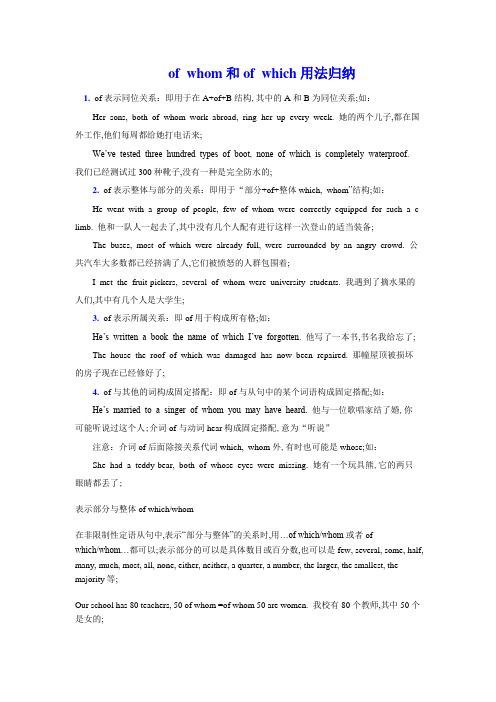
of whom和of which用法归纳1. of表示同位关系:即用于在A+of+B结构,其中的A和B为同位关系;如:Her sons, both of whom work abroad, ring her up every week. 她的两个儿子,都在国外工作,他们每周都给她打电话来;We’ve tested three hundred types of boot, none of which is completely waterproof.我们已经测试过300种靴子,没有一种是完全防水的;2. of表示整体与部分的关系:即用于“部分+of+整体which, whom”结构;如:He went with a group of people, few of whom were correctly equipped for such a c limb. 他和一队人一起去了,其中没有几个人配有进行这样一次登山的适当装备;The buses, most of which were already full, were surrounded by an angry crowd. 公共汽车大多数都已经挤满了人,它们被愤怒的人群包围着;I met the fruit-pickers, several of whom were university students. 我遇到了摘水果的人们,其中有几个人是大学生;3. of表示所属关系:即of用于构成所有格;如:He’s written a book the name of which I’ve forgotten. 他写了一本书,书名我给忘了;The house the roof of which was damaged has now been repaired. 那幢屋顶被损坏的房子现在已经修好了;4. of与其他的词构成固定搭配:即of与从句中的某个词语构成固定搭配;如:He’s married to a singer of whom you may have heard. 他与一位歌唱家结了婚,你可能听说过这个人;介词of与动词hear构成固定搭配,意为“听说”注意:介词of后面除接关系代词which, whom外,有时也可能是whose;如:She had a teddy-bear, both of whose eyes were missing. 她有一个玩具熊,它的两只眼睛都丢了;表示部分与整体of which/whom在非限制性定语从句中,表示“部分与整体”的关系时,用…of which/whom或者ofwhich/whom…都可以;表示部分的可以是具体数目或百分数,也可以是few, several, some, half, many, much, most, all, none, either, neither, a quarter, a number, the larger, the smallest, the majority等;Our school has 80 teachers, 50 of whom =of whom 50 are women. 我校有80个教师,其中50个是女的;He has lots of books, most of which are English ones. 他有许多书,其中大部分是书;注意:这里的of which不能用whose代替,这与表示所属关系的of which不同:The room the door of which =whose door is blue belongs to me. 门是蓝色的那间房是我的;英语定语从句的3个重要概念:1. 定义:用来修饰某个名词、代词或整个句子的从句就叫做定语从句;如:The man you talked about is our headmaster. 你们刚才所谈论的那个人是我们的校长This is the bike my father gave me as my birthday present. 这是我父亲送给我作为生日礼物的单车;The tree whose leaves are red was planted last year. 那棵叶子红色的树是去年栽的2. 先行词:定语从句所修饰的词就叫做先行词,它一般是由名词、代词或句子充当;如:The boy who is singing at the stage is only nine years old. 在舞台上唱歌的那个男孩今年才九岁;现行词是名词Anyone that is willing to help others is welcome to our group. 任何愿意帮助他人的人都欢迎来参加我们的组织;现行词是代词His mother is out of danger, which excites their family very much. 他母亲脱离了危险,这件事情使他们家兴奋不已;现行词是句子3. 关系词:引导定语从句的词就叫做关系词;根据关系词的用法不同,关系词又分关系代词和关系副词,其中关系代词有that, which, who, whom, whose, as, but等,关系副词有where, when, why等;关系词既起连接先行词与定语从句的作用,又做从句中的某个句子成分;如:Li Lei is one of the students who are working very hard. 李蕾是一个学习非常努力的学生;引导词whoThere is nobody but knows you here. 这儿没有不认识你的人;引导词butHe led us to a place where we have never been before. 他把我们带到了我们以前从未去过的地方; 引导词whereof whom/which引导的定语从句:在非限制性定语从句中,先行词作为一个整体,表示整体中的一部分,即表示“部分与整体”的关系时,用…of which / whom或者of which / whom…都可以;但与表示所属关系不同,这里不能用whose来代替of which;一、表示整体中的部分The buses, most of which were already full, were surrounded by an angry crowd. 公共汽车大多数都已经挤满了人,它们被愤怒的人群包围着;I picked up the apples, some of which were badly bruised. 我拣起那些苹果,其中有一些伤得很厉害;I bought a dozen eggs, six of which broke when I dropped the box. 我买了一打鸡蛋,六个在我失手掉了盒子时摔碎了;There are two bottles left, one of which is almost finished and the other of which is not quite. 只剩两瓶,一瓶快喝完了,另一瓶没完全喝完;The treasure some of which has been recovered, has been sent to the British Museum. 这些宝藏已送往大英博物馆,其中有一些是失而复得的;二、表示所属关系He’s written a book, the name of which I’ve forgotten. 他写了一本书,书名我忘了;句中的the name of which=whose name;It was an agreement the details of which could not be altered. 这是一项其细节不可更改的协定;句中的the details of which=whose details;在中,表示“部分与整体”的关系时,用…of which/whom或者of which/whom…都可以;表示部分的可以是具体数目或百分数,也可以是few, several, some, half, many, much, most, all, none, either, neither, a quarter, a number, the larger, the smallest, the majority等;Our school has 80 teachers, 50 =of whom 50 are women. 我校有80个教师,其中50个是女的;He has lots of books, most of which are English ones. 他有许多书,其中大部分是英语书;注意:这里的不能用whose代替,这与表示所属关系的of which不同:The room the door =whose door is blue belongs to me. 门是蓝色的那间房是我的在非限制性定语从句中,先行词作为一个整体,表示整体中的一部分,即表示“部分与整体”的关系时,用…of which / whom或者of which / whom…都可以;但与表示所属关系不同,这里不能用whose来代替of which;一、表示整体中的部分The buses, most of which were already full, were surrounded by an angry crowd. 公共汽车大多数都已经挤满了人,它们被愤怒的人群包围着;I picked up the apples, some of which were badly bruised. 我拣起那些苹果,其中有一些伤得很厉害;I bought a dozen eggs, six of which broke when I dropped the box. 我买了一打鸡蛋,六个在我失手掉了盒子时摔碎了;There are two bottles left, one of which is almost finished and the other of which is not quite. 只剩两瓶,一瓶快喝完了,另一瓶没完全喝完;The treasure some of which has been recovered, has been sent to the British Museum. 这些宝藏已送往大英博物馆,其中有一些是失而复得的;二、表示所属关系He’s written a book, the name of which I’ve forgotten. 他写了一本书,书名我忘了;句中的the name of which=whose name;It was an agreement the details of which could not be altered. 这是一项其细节不可更改的协定;句中的the details of which=whose details;一、用法说明介词+whom只能指人;介词+ which只能指物;如:Look, there comes Tom, for whom I have waiting for an hour. 瞧,汤姆来啦,我等他等了一个小时; Last Saturday evening,I went to Wu Dong s birt一、用法说明介词+whom只能指人;介词+ which只能指物;如:Look, there comes Tom, for whom I have waiting for an hour. 瞧,汤姆来啦,我等他等了一个小时;Last Saturday evening, I went to Wu Dong’s birthday party, in which I met a foreig ner named Jim. 上周星期六的晚上我去参加了吴东的生日聚会,在会上我会到了一个叫吉姆的外国人;She came into the house, on whose wall there was a portrait of Einstein. 她进入了房间,房子的墙壁上有一张爱因斯坦的画像;二、注意事项1有时,前面的介词可移到定语从句的中间或后面,此时whom可用who, that代替;whi ch可以用that代替;而且who, whom, which, that都可省略;如:The man with whom you talked just now is our manager. —The man who you talke d with just now is our manager. 你刚才与他谈话的那个人就是我们的经理;He handed me a pen, with which I wrote down my address for him. —He handed m e a pen, which I wrote down my address with for him. 他递给我一支钢笔,我就用那支钢笔给他写下了我的地址;2当先行词是时间、地点、原因从句时,介词+ which一般在定语从句中分别做时间、地点、原因状语,于是介词+ which可以分别用when, where, why代替;但若介词+ which不是作时间、地点、原因状语,则不能用when, where, why代替;如:Last week, I visited Shanghai, in which I have made several friends. —Last week, I visited Shanghai, where I have made several friends. 上周我参观了上海,在那儿我叫上几个朋友;I will remember the day forever on which I won the first place in the contest. —I will remember the day forever when I won the first place in the contest. 我将永远记住我在竞赛中获得第一名的那一天;三、介词的选用介词+关系代词引导定语从句时,介词往往受上下文的约束,究竟使用哪个介词时得从下面几方面来进行考虑;1从先行词跟介词的搭配习惯出发;如:In front of my house, there is a tree, in which some birds are singing. 我的房子前有一棵树,鸟儿正在树上唱歌;在树上一般用介词in2The computer for which I paid 5,000yuan is made in Shenzhen. 我花了五千元所买的这台电脑使深圳造的; pay 与for搭配3 从先行词、定语从句中的动词或形容词两方面同时考虑出发;如:Do you know the girl with whom the man talked just now 你认识跟那个男谈话的女孩吗talk 究竟接to, with还是接about, 这该由动词及现行词一起决定4复合介词+关系代词;如:Go down this road, at the end of which you can see a high building and it is our o ffice building. 沿着条路走,在路的尽头你会看到一座高大的建筑,那就是我们的办公大楼;5名词+介词+ 关系代词;如:He has three children, one of whose children is studying abroad now. 他又三个小孩,其中一个在国外读书;注意:当定语从句的动词与介词是不可分割的固定搭配时,介词不能放到关系代词之前;如:She has a little daughter, who is looked after by her grandma. 就不能写成:She has a little daughter, after whom is looked by her grandma. 因为,look after 是不可分开的固定短语;介词+关系代词转载定语从句是中学阶段英语学习的主要语法之一,也是高考题的命题热点所在,其中定语从句中关系代词前的判断更是高考英语命题的一个高频考点;下面,我们先来看看近两年高考中部分定语中“+关系代词”结构;01.Eric received training in computer for one year, ___B___ he found a job in a big company.辽宁A. after thatB. after whichC. after itD. after this02. Human facial expressions differ from those of animals in the degree ___B___ they can be controlled on purpose.重庆A. with whichB. to whichC. of whichD. for which03. It is reported that two schools, ___D___ are being built in my hometown, will open next year. 四川A .they both B. which both C. both of them D. both of which04. Last week, only two people came to look at the house, ___D___ wanted to buy it 安徽A. none of themB. both of whomC. none of whomD. neither of whom05. He was educated at the local high school, ___A___ he went on to Beijing University.江苏A. after whichB. after thatC. in whichD. in that06.She was educated at Beijing University, ___A___ she went on to have her advanced study abroad. 全国IIwhich B. from which C. from that D. after that07. We saw several natives advancing towards our party, and one of them came up to us ___B___ we gave some bells and glasses. 湖南A. to whichB. to whomC. with whomD. with which08. I was given three books on cooking, the first ___B___ I really enjoyed. 浙江A. of thatB. of whichC. thatD. which09. I saw a woman running toward me in the dark. Before I could recognize who she was,she had run back in the direction___D___ she had come. 重庆A. of whichB. by whichC. in whichD. from which对于“+which / whom”结构的考查,高考英语主要涉及以下几个方面:1.考查定语中谓语动词的搭配习惯1看定语中动词与的搭配Water is the natural medium in which fish live. 水是鱼类赖以生存的自然环境;注意搭配live inThe documents for which they were searching have been recovered. 他们找寻的文件已经找到了;注意搭配search forThis is a subject about which we might argue for a long while. 这是一个我们可能长时间争论的问题;注意搭配argue aboutI wanted to find someone with whom I could discuss books and music. 我想找到一个可以和我谈书和音乐的人;注意搭配discuss sth with sb注:有一些为的一部分,此时它们的位置应注意;如:The boy whom my sister is looking after is getting better.不能说成:The boy after whom my sister is looking is getting better.2看定语中形容词与的搭配He referred me to some reference books with which I am not very familiar. 他我要去参考一些我不熟悉的参考书;注意搭配be familiar with2.考查先行词与的搭配习惯这类考题往往要根据具体的语境来选择;如:This is our classroom, in the front of which there is a teacher’s desk. 这是我们的教室,前面有老师的讲台;注意搭配in the front of our classroomI’ll never forget the day on which she said goodbye to me. 我永远不会忘记她与我们告别的那一天;注意搭配on the day3.考查表示所属关系的of which whomOn the blackboard the teacher wrote a sentence, the meaning of which I don’t understand. 老师在黑板上写了一个句子,句子的意思我不明白;注意搭配the meaning of the sentence4.考查表示整体与部分关系的of which whomI have five English dictionaries of which Longman Dictionary is the best. 我有5本英语词典,其中最好的是朗文词典;注意搭配of the five dictionariesThe buses, most of which were already full, were surrounded by an angry crowd. 多数公共汽车已经上满了人,周围是一伙愤怒的群众;注意搭配most of the busesI met the fruit-pickers, several of whom were university students. 我碰到那些摘水果的人,其中有好几个是大学生;注意搭配several of them5.考查表示同位关系的of which whomHer sons, both of whom work abroad, rang her up this morning. 她的两个儿子都在国外工作,今天早上给她来了电话;注意搭配both of her sons模拟测试用适当的和关系代词填空:1. Do you like the book _______ she spent $102. Do you like the book ________ she paid $103. Do you like the book ________ she learned a lot4. Do you like the book _______ she often talks5. He built a telescope________ he could study the skies.6. There is a tall tree outside, ________ stands our teacher.7. China has a lot of rivers, the second longest _______ is the Yellow River.8. The tower _____ people can have a good view is on the hill.9. The man ________ I spoke on the phone last night is very good at wrestling.10.He paid the boy $10 for washing ten windows, most ______ hadn’t been cleaned for at least a year.11. The workers, some _______ stayed for four years, came from different countries.12. The committee consists of 20 members, 5 ______ are women.13. The book contains 50 poems, most ______were written in the 1930s.14. There are two left, one ______ is almost finished, and the other ______ is not.参考答案1. on which2. for which3. from in which4. about which5. through which6. under which7. of which8. from which9. to whom 10. of which 11. of whom 12. of whom13. of which 14. of which, of which限制性定语从句:限制性定语从句对先行词起限制、修饰的作用,关系代词有that,which,whom,who,whose以及关系副词when,where等,没有明显的逗号把从句与主语分开,表达的意思为被修饰词的一个定语;例句:Do you know the professor who is speaking at the meetingWhere is the book which I bought this morning非限制性定语从句:作用相当于一种插入语或者对先行词的一种解释,和先行词之间只有比较松散的关系,文字中常常用逗号将其与主句分开,用法其实与限制性定语从句极为相似,只是不能用that做修饰词;例句:This letter is from his parents, who are working in Tibet.Englishi is an important subject, which every students should study well.The building, in front of which sat a boy, was a school.一、定语从句有限制性和非限制性两种;限制性定语从句是先行词不可缺少的部分,去掉它主句意思往往不明确;非限制性定语从句是先行词的附加说明,去掉了也不会影响主句的意思,它与主句之间通常用逗号分开,例如:This is the house which we bought last month. 这是我们上个月买的那幢房子;限制性The house, which we bought last month, is very nice.这幢房子很漂亮,是我们上个月买的;非限制性2 当先行词是专有名词或物主代词和指示代词所修饰时,其后的定语从句通常是非限制性的,例如:Charles Smith, who was my former teacher, retired last year. 查理·史密斯去年退休了,他曾经是我的老师; My house, which I bought last year, has got a lovely garden. 我去年买的的那幢房子带着个漂亮的花园; This novel, which I have read three times, is very touching. 这本小说很动人,我已经读了三遍;3 非限制性定语从句还能将整个主句作为先行词, 对其进行修饰, 这时从句谓语动词要用第三人称单数,例如:He seems not to have grasped what I meant, which greatly upsets me. 他似乎没抓住我的意思,这使我心烦;Liquid water changes to vapor, which is called evaporation. 液态水变为蒸汽,这就叫做蒸发;二、从形式上看,限制性定语从句与其先行词紧紧相连,两者没有停顿;非限制性定语从句与先行词之间有逗号隔开;从意义上讲,限制性定语从句用来修饰先行词,两者密不可分;而非限制性定语从句仅仅对先行词作补充性叙述或说明,两者关系不那么紧密;由于两种定语从句存在着这些区别,一般来说,限制性定语从句多半译成汉语的前置定语,修饰其后的先行词,非限制性定语从句则往往译成后置的并列从句;that不能引导非限制性定语从句;通常对定语从句处理如下:1 限制性定语从句译成前置定语These neighborhoods frequently recreate much of the culture and the values of the nationality that makes up the majority of the population.这些居民区经常再现构成大多数居民的大量民族文化和价值观念;2 非限制性定语从句译成后置的并列分句In almost all developing countries, economic development depends upon growth in export trade, which in turn creates jobs and raises living standards.几乎所有的发展中国家经济的发展都依赖于出口贸易的增长,而出口的增长又有助于创造更多的就业机会和提高人民的生活水平;但是,有时候因为意思上的关系,或者出于汉语句子结构上的考虑,要把限制性定语从句译成后置的并列分句,而把非限制性定语从句译成前置定语;3 限制性定语从句译成后置的并列从句Each team plays ten or eleven games each season which begins in September and ends in November. 每个队每赛季参加十到十一场比赛,每个赛季九月份开始,十一月份结束;4 非限制性定语从句译成前置定语He appeared to be returning home from a walk, for his buckle shoes, which followed a fashion long since out of date, were covered with dust.他好象是散步之后回家去,因为他那早已过时的扣鞋上布满了灰尘;5 有的定语从句,从意义上看实际相当于一个状语从句,表示原因,目的,结果,让步等关系;这样的定语从句应译出汉语的偏正复句,但是要加上相应的连接词以表明其与主句的关系;Norway is, quite naturally, paying great attention to developments in Europe and in the Atlantic community, which are so instrumental to the maintenance of peace and security in our part of the world. 挪威自然十分关切欧洲和大西洋国家的发展,因为这些发展大大有助于维护世界上我们这一地区的和平和安全说明:关系代词that和关系副词why不能引导非限制性定语从句;三、下面是些例题,你做做看;一、that不能用来引导非限制性定语从句;如:考例一She heard the terrible noise, ________brought her heart into her mouth.A. itB. whichC. thisD. that解析选B;后半句为非限制性定语从句,尽管先行词noise属于事物,也不能用that而要用which来引导;which 指代noise,在从句中作主语;二、除which外,还可用when,where,whose,whom等引导非限制性定语从句,且各自的用法及差异与它们用在限制性定语从句时相同;如:Next month, when youll spend your summer holidays in your hometown, is approaching. 下个月即将来临,届时你们将在家乡度暑假;关系副词when指代表示时间的名词next month,并作从句的状语;She is going to live in Macao, where she has some close friends. 她要到澳门去居住,在那里她有几个密友; 关系副词where指代表示地点的名词Macao,并在从句中作状语;考例二Recently I bought an ancient Chinese vase, ________was very reasonable.A. which priceB. the price of whichC. its priceD. the price of whose解析选B;whose在从句中作表示所属关系的定语,既可指代人,也可指代物;指物时,常可转换为of which;指人时常可转换为of whom;考例三In the office I never seem to have time until after 5:30 pm,______many people have gone home.A. whose timeB. thatC. on whichD. by which time解析先行词5:30 pm与time之间是一种同位关系,可用which来作定语替代;从句中的完成状态,常与by短语连用;故选D;三、在非限制性定语从句中作宾语的关系代词不能省略;如:He was eager to go to the hospital to see his stepmother, whom he loved as his own mother. 他迫切地想到医院去看望他的继母,他把继母当自己的亲妈妈一样爱戴;四、非限制性定语从句的关系代词which,既可以指代前面的先行词,也可以指代前面整句的含义;如:考例四Dorothy was always speaking highly of her role in the play, of course,________made the others unhappy.A. whoB. whichC. thisD. what解析选B;指代“Dorothy总是高度评价自己在那场戏中所担任的角色”的整个事件;考例五Carol said the work would be done by October,________personally I doubt very much.A. itB. thatC. whenD. which解析表示时间的名词October,用“我个人非常怀疑”来修饰,意思不通;应该修饰整个主句, 表示对“Carol说在十月前能做好这项工作”怀疑;故选D;五、引导非限制性定语从句时as和which的差异:从句置于句首时,非限制性定语从句只能用as引导,而置于句末时,两者都可以使用; 如:考例六________is known to everybody, the moon travels round the earth once every month.A. ItB. AsC. ThatD. What解析逗号表明为非限制性定语从句;选B;考例七________is mentioned above, the number of the students in senior high schools is increasing.A. WhichB. AsC. ThatD. It解析答案为B;与考例六同理;典型定语从句易错题详解■The factory was built in a secret place, around ______ high mountains.A. which wasB. it wasC. which wereD. them were易错容易误选A或B,将A、B中的which 和it 误认为是其后句子的主语;分析最佳答案是C,around which were high mountains 是一个由“介词+which”引出的非限制性定语从句,而在该从句中,主语是high mountains,around which 是表语,所以句子谓语应用复数were,而不是用单数was;请做以下类例题目答案均为C:1 Yesterday we visited a modern hospital, around _______ some fruit shops.A. which isB. it isC. which areD. them are2 The murder happened in an old building, beside ______ the city police station.A. which areB. it isC. which isD. them are3 Next month we’ll move to a new building, next to _______ a nice restaurants where we can have Chinese food.A. which areB. it isC. which isD. them are■A man with a bleeding hand hurried in and asked, “Is there a hospital around ______ I can get some medicine for my wounded hand”A. thatB. whichC. whereD. what易错容易误选B,认为around 是介词,选which 用以代替前面的名词hospital,在此用作介词around 的宾语;分析最佳答案为C;以上语法分析并不算错,但问题是,照此分析,此句的意思即为:有没有这样一个医院,我在它的附近可以买药治我的手伤这样的语境显然有点不合情理,因为人们通常是在医院里面治伤,而不是在医院附近治伤;此题选C 的理由是:句中的around 不是介词,而是副词,意为“在附近”;其后的where 引导定语从句用以修饰其前的地点名词hospital,句意为:附近有没有一家医院,我可以去治我的手伤■_____ is known to everybody, the moon travels round the earth once every month.A. ItB. AsC. ThatD. What易错容易误选A,认为此处应填一个形式主语;分析最佳答案是B;as 引导的是一个非限制性定语从句;比较下面一题:_______ is known to everybody that the moon travels round the earth once every month.A. ItB. AsC. ThatD. What此题答案选A,it 为形式主语,真正的主语是后面的that 从句;再比较下面一组题,其中第1题选B,第2题选D:1 ______ is mentioned above, the number of the students in senior school is increasing.A. WhichB. AsC. ThatD. It2 ______ is mentioned above that the number of the students in senior school is increasing.A. WhichB. AsC. ThatD. It■David is such a good boy _______ all the teachers like.A. thatB. whoC. asD. whom易错此题容易误选A,许多同学一看到题干中的such,再联系到选项中的that,便认为这是考查such … that …句式;况且,这样理解意思也还通顺;分析最佳答案为C,不是A,因为在such … that … 如此……以至……结构中,that 引导的是结果状语从句,并且that 在从句中不充当句子成分,若在上句填入such … that …,句末的动词like 缺宾语;选C的理由如下:as 用作关系代词,用以引导定语从句,修饰其前的名词boy,同时as 在定语从句中用作动词like 的宾语,句意为“所有老师都喜欢的一位好男孩”;有的同学可能还会问,假若选A,能否将其后的that 视为引导定语从句的关系代词呢不能,因为当先行词受到such 的修饰时,其后的定语从句应用关系代词as 来引导,而不用that;比较下面一题,答案为A,因为like 后有自己的宾语him:David is such a good boy _______ all the teachers like him.A. thatB. whoC. asD. whom请再做以下试题答案选D:It was not such a good dinner _______ she had promised us.A. likeB. thatC. whichD. as■The buses, most of _______ were already full, were surrounded by an angry crowd.A. thatB. itC. themD. which易错容易误选C,用them 代指the buses;分析最佳答案是D;most of which were already full 为非限制性定语从句,修饰the buses;类似地,以下各题也选D:1 His house, for _______ he paid $10, 000, is now worth $50, 000.A. thatB. itC. themD. which2 Ashdown forest, through _______ we’ll be driving, isn’t a forest any longer.A. thatB. itC. themD. which3 This I did at nine o’clock, after _______ I sat reading the paper.A. thatB. itC. themD. which类似地,以下各题选whom,不选them:4 George, with _______ I played tennis on Sundays, was a warm-hearted person.A. thatB. himC. themD. whom5 Her sons, both of ______ work abroad, will come back home this summer.A. thatB. whoC. themD. whom6 I met the fruit-pickers, several of _______ were still university students.A. thatB. whoC. themD. whom■He had thousands of students, many of ______ gained great success in their own field.A. whomB. themC. whichD. who易错容易误选B,用them 代指students;分析最佳答案是A,many of whom gained great success in their own field 为非限制性定语从句;假若在many of… 的前面加上连词and,则选答案B;比较以下各题答案均选A:1 He asked a lot of questions, none of ______ was easy to answer.A. whichB. themC. whatD. that2 He asked a lot of questions, and none of ______ was easy to answer.A. themB. whichC. whatD. that3 He told me that he had two girl-friends, neither of _______ knew anything about the other.A. whomB. themC. whichD. who4 He told me that he had two girl-friends, and neither of _______ knew anything about the other.A. themB. whomC. whichD. who■He had a lot of friends, only a few of ______ invited to his wedding.A. whomB. themC. whichD. who易错容易误选A,认为这是非限制性定语从句;分析最佳答案是B,这不是非限制性定语从句,而是一个独立主格结构,因为空格后的动词invited 并不是一个完整的谓语,而是一个过去分词;当然,假若在invited 前加上助动词were,则是一个非限制性定语从句,答案便应选A;比较:1 They put forward a lot of plans at the meeting, none of _______ carried out in their work.A. whichB. themC. whatD. that答案选B,none of them carried out in their work 是独立主格结构,其中的carried out 为过去分词;2 They put forward a lot of plans at the meeting, none of _______ were carried out in their work.A. whichB. themC. whatD. that答案选A,none of them were carried out in their work 是非限制性定语从句,注意与上例比较句中多了一个助动词were;3 They put forward a lot of plans at the meeting, but none of _______ were carried out in their work.A. whichB. themC. whatD. that答案选B,由于两句之间增加了一个并列连词but,使得该句成了一个并列句■On Sundays there were a lot of children playing in the park, _______ parents seated together joking.A. theirB. whoseC. whichD. that易错容易误选B,认为这是非限制性定语从句;分析最佳答案是A;与上面一题相似,their parents seated together joking 不是非限制性定语从句,而是一个独立主格结构,因为空格后的动词seated 不是谓语,而是一个过去分词,因为seat 作动词用时,是及物动词;比较以下相似题:1 On Sundays there were a lot of children playing in the park, _______ parents were seated together joking.A. theirB. whoseC. whichD. that选B;whose parents were seated together joking 为非限制性定语从句,因为其后有完整的谓语were seated;2 On Sundays there were a lot of children playing in the park, and _______ parents were seated together joking.A. theirB. whoseC. whichD. that选A;因为句中有并列连词and,整个句子为并列句;。
定语从句关系代词which,who,whom,whose的用法

2. The boy (whom) she loved died in the war. (先行词为the boy, 指人;宾语)
Tip 1: 先行词为指人的名词或代词,且同时在从句中做主 语时,我们用who连接;若做宾语时,则常用whom连接, whom也可省略。
has done badly this season.
The End Thank you!
( 先行词为books, 指物; 定语)
6. Who is the girl whose father is a doctor? ( 先行词为 the girl, 指人;定语)
Tip 3: 当先行词在从句中做定语修饰名词时,我们用 whose 来引导,whose表示所属关系,某人的或者某物的。
注意事项
whose 可与of which 转换
This is the house whose window broke last night.
=This is the house, the window of which broke last night
= This is the house, of which the window broke last night.
practice
用关系代词which, who, whom, whose 填空。
1. The man(w__h_o_/_w__h_o_m__)you met just now is my old friend.
2. The police found the carw_h__ic_h_ ran into mine. 3. She is the student _w__h_o_s_e__ pronunciation is the best in
英语定语从句的用法
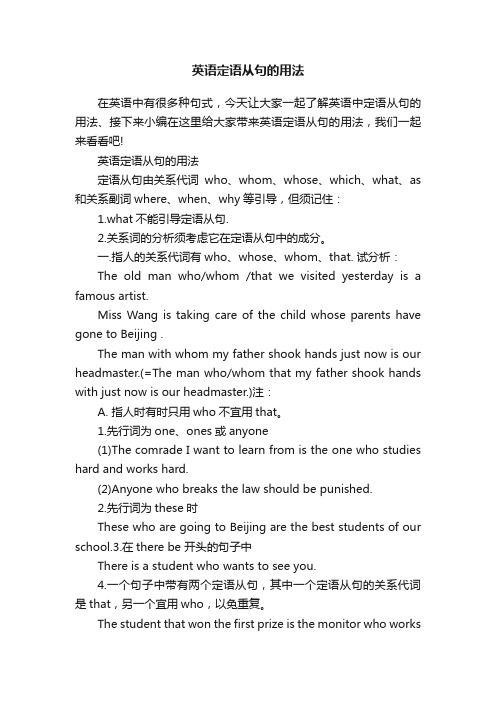
英语定语从句的用法在英语中有很多种句式,今天让大家一起了解英语中定语从句的用法、接下来小编在这里给大家带来英语定语从句的用法,我们一起来看看吧!英语定语从句的用法定语从句由关系代词who、whom、whose、which、what、as 和关系副词where、when、why等引导,但须记住:1.what不能引导定语从句.2.关系词的分析须考虑它在定语从句中的成分。
一.指人的关系代词有who、whose、whom、that. 试分析:The old man who/whom /that we visited yesterday is a famous artist.Miss Wang is taking care of the child whose parents have gone to Beijing .The man with whom my father shook hands just now is our headmaster.(=The man who/whom that my father shook hands with just now is our headmaster.)注:A. 指人时有时只用who不宜用that。
1.先行词为one、ones或anyone(1)The comrade I want to learn from is the one who studies hard and works hard.(2)Anyone who breaks the law should be punished.2.先行词为these时These who are going to Beijing are the best students of our school.3.在there be 开头的句子中There is a student who wants to see you.4.一个句子中带有两个定语从句,其中一个定语从句的关系代词是that,另一个宜用who,以免重复。
ofwhom和ofwhich用法归纳

of whom和of which用法归纳1. of表示同位关系:即用于在A+of+B结构,其中的A和B为同位关系。
如:Her sons, both of whom work abroad,ring her up every week. 她的两个儿子,都在国外工作,他们每周都给她打电话来。
We’vetestedthree hundred types of boot, none of which is complet ely waterpr oof. 我们已经测试过300种靴子,没有一种是完全防水的。
2. of表示整体与部分的关系:即用于“部分+of+整体(which, whom)”结构。
如:He went with a group of people, few of whom were correct ly equippe d for such a climb. 他和一队人一起去了,其中没有几个人配有进行这样一次登山的适当装备。
The buses, most of which were already full, were surroun ded by an angry crowd. 公共汽车大多数都已经挤满了人,它们被愤怒的人群包围着。
I met the fruit-pickers, several of whom were univers ity student s. 我遇到了摘水果的人们,其中有几个人是大学生。
3. of表示所属关系:即of用于构成所有格。
如:He’swrittenabookthenameofwhichI’veforgott en. 他写了一本书,书名我给忘了。
The house the roof of which was damaged has now been repaire d. 那幢屋顶被损坏的房子现在已经修好了。
who,whom,whose,which和what的用法
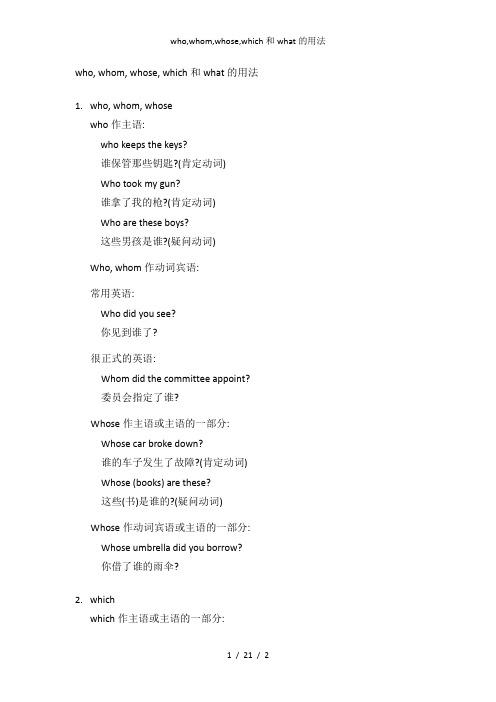
who, whom, whose, which和what的用法1.who, whom, whosewho作主语:who keeps the keys?谁保管那些钥匙?(肯定动词)Who took my gun?谁拿了我的枪?(肯定动词)Who are these boys?这些男孩是谁?(疑问动词)Who, whom作动词宾语:常用英语:Who did you see?你见到谁了?很正式的英语:Whom did the committee appoint?委员会指定了谁?Whose作主语或主语的一部分:Whose car broke down?谁的车子发生了故障?(肯定动词)Whose (books) are these?这些(书)是谁的?(疑问动词)Whose作动词宾语或主语的一部分:Whose umbrella did you borrow?你借了谁的雨伞?2.whichwhich作主语或主语的一部分:which pigeon arrived first?哪一只鸽子先到达的?(肯定动词)Which of them is the eldest?他们中谁的年龄最大?(肯定动词)Which作动词宾语或宾语的一部分:Which hand do you use?你用哪一只手?Which of these dates would you prefer?这几个日期你喜欢哪一个?3.whatwhat作主语或主语的一部分:what caused the explosion?是什么引起爆炸的?(肯定动词)What kind of tree is that?那是哪种树?(肯定动词)What作动词宾语或宾语的一部分:What paper do you read?你经常看什么报纸?What did they eat?他们吃了什么?。
定语从句的引导词与用法

定语从句的引导词与用法定语从句是指修饰名词或代词的从句,用来对其进一步进行描述或限定。
在定语从句中,引导词的选择非常重要,不同的引导词会决定从句的结构和意义。
本文将介绍定语从句中常见的引导词及其用法。
一、关系代词引导的定语从句1. 关系代词"that""that"在定语从句中作主语或宾语时常用来引导非限制性定语从句,并且在口语和非正式写作中,常被省略。
例如:- The book that I borrowed from the library is very interesting.- The teacher that we all respect is retiring next year.2. 关系代词"which"和"who""which"用来引导非限制性定语从句,修饰非人称名词或整个句子;"who"用来引导非限制性定语从句,修饰人称名词。
例如:- The car, which is parked outside, belongs to my brother.- John, who is my best friend, is coming to visit me tomorrow.3. 关系代词"whose""whose"用来修饰人的名词,在定语从句中相当于"of whom"或"of which",表示所属关系。
例如:- The man whose daughter won the award is a famous actor.- The company whose products we use is very reliable.4. 关系代词"whom""whom"在定语从句中作宾语时,用来修饰人的名词,并且常被省略。
定语从句和名词性从句的区别和比较
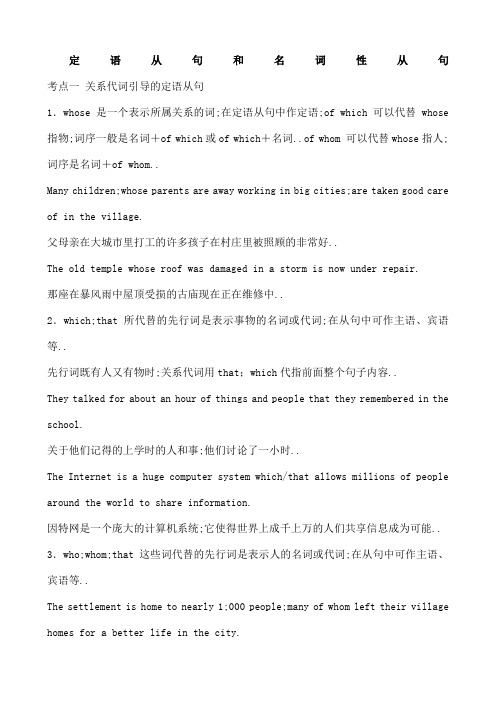
定语从句和名词性从句考点一关系代词引导的定语从句1.whose是一个表示所属关系的词;在定语从句中作定语;of which可以代替whose 指物;词序一般是名词+of which或of which+名词..of whom 可以代替whose指人;词序是名词+of whom..Many children;whose parents are away working in big cities;are taken good care of in the village.父母亲在大城市里打工的许多孩子在村庄里被照顾的非常好..The old temple whose roof was damaged in a storm is now under repair.那座在暴风雨中屋顶受损的古庙现在正在维修中..2.which;that所代替的先行词是表示事物的名词或代词;在从句中可作主语、宾语等..先行词既有人又有物时;关系代词用that;which代指前面整个句子内容..They talked for about an hour of things and people that they remembered in the school.关于他们记得的上学时的人和事;他们讨论了一小时..The Internet is a huge computer system which/that allows millions of people around the world to share information.因特网是一个庞大的计算机系统;它使得世界上成千上万的人们共享信息成为可能.. 3.who;whom;that这些词代替的先行词是表示人的名词或代词;在从句中可作主语、宾语等..The settlement is home to nearly 1;000 people;many of whom left their village homes for a better life in the city.近千人在这一社区居住;他们当中很多都是从农村老家来城市寻求更好的日子的..考点二介词提前了的定语从句1.与定语从句中的动词构成搭配..In the dark street;there wasn't a single person to whom she could turn for help.在漆黑的大街上没有一个人能为她提供帮助..2.与定语从句所修饰的先行词构成搭配..Patience;without which you can't do the work well;is a kind of quality.耐心是一种品质..没有了耐心;你不能做好工作..3.of+which/whom表示所属关系..表所属关系也可用whoseRecently I bought an ancient vase;the price of which=whose pricewas very reasonable.最近我买了个古老的花瓶;它的价钱很合理..考点三关系副词引导的定语从句1.关系副词在定语从句中作状语;when指时间;where指地点;why指原因;在定语从句中分别作时间状语、地点状语和原因状语..Occasions are quite rare when I have time to spend a day with my kids.我有时间和孩子们一起度过一天的机会很少..After graduation I'd like to find a job where I can use what I have learnt at school.毕业后我要找到一份能利用在学校所学知识的一份工作..2.先行词是时间名词或地点名词时;如果在从句中不作状语;则不能用when或where 引导定语从句;而要用which/that..Is this the reasonthat /whichhe gave us for the delay of the project这是他给出工程推迟的原因吗考点四先行词为point; situation; case等的定语从句point;situation;case;activity等;从表面上看它们不是表地点的;但却表示类似地点的意义;因此它们作先行词时;如果引导词在从句中作状语;那么这个引导词要用where;如果不作状语;则用关系代词that/which..It's helpful to put children in a situation where they can see themselves different.where作状语把孩子放在一个能使他们从另外一个角度认识自己的环境中对他们有益..I have reached a point in my life where I am supposed to make decisions of my own.where作状语我已经到了应该自己作决定的那个人生阶段..Now there is just one point that/which I wish you make quite clear.which/that 作宾语现在只有一点我希望你弄清楚..考点五主语从句主语从句在主句中作主语;位于主句谓语动词之前;但多数情况下由it作形式主语;而把真正的主语放在句子的后面;其句型结构为:It+be+n./adj.+that/whether/why/when+从句..It never occurred to me that you could succeed in persuading him to change his mind.我真的没有想到你能说服他改变主意..It is uncertain what side effect the medicine will bring about;although about two thousand patients have taken it.尽管已经有两千名病人服用了这种药品;但是;这种药品会带来什么副作用还不明确.. Whether there are living creatures in the outer space as those on Earth hasn't been proved up to now.外太空是否存在像地球上一样的生物迄今尚未确定考点六同位语从句1.同位语从句常放在fact;news;idea;truth;hope;problem;information;belief;thought;doubt 等名词的后面;是对前面的名词作进一步的解释;说明前面名词的具体含义..There seems to be no possibility that Li Hua can win the first prize in the 100meter race.看起来似乎李华在一百米比赛中没有可能获得一等奖..There is a popular belief among the Europeans that chicken soup can help cure flu.欧洲人普遍相信鸡汤可以帮助治愈流感..The question has been raised at the meeting whether each member country should equally share the expense of the committee.每一个成员国是否均等分担委员会的费用在会议上提出..I have no idea when he will come back.我不知道他将何时回来..2.同位语从句与定语从句的区别:同位语从句是对前面名词的内容作进一步的解释、说明;引导词只起引导作用;不在句中作任何成分;一般不可省略..定语从句是对前面名词进行修饰、限制;引导词在句中作一定的句子成分..The news that they had won the game soon spread over the whole school.他们赢得比赛的消息很快就传遍了整个学校..此句为同位语从句;进一步解释“the news”的内容The news you told me yesterday was really disappointing.你昨天告诉我的消息真的很令人失望..此句是定语从句;它指的是“你昨天告诉我的那个消息”考点七表语从句表语从句在句中作表语;位于主句的系动词之后..引导表语从句的连词有that;whether;as if;疑问代词有who;what;which;疑问副词where;why;when;how 等..The problem is that we don't have much time left.问题是我们剩下的时间很少.. My question is who is responsible for all this.我的问题是谁对这事负责..考点八“疑问词+ever”与“no matter+疑问词”的区别“疑问词+ever”与“no matter+疑问词”虽然都有“无论……”的意思;但是用法有区别:“疑问词+ever”既可以引导名词性从句也可引导状语从句;而“no matter +疑问词只能用来引导状语从句..The poor young man is ready to accept whatever help he can get.这位可怜的年青人无论什么样的帮助都乐意接受..The how to book can be of help to whoever wants to do the job.指南类的书对想从事这项工作的人会有帮助..Whatever/No matter what you say ;I will not believe you.无论你说什么;我都不会相信你..语法训练1.2011年高考重庆卷 It is still under discussion________ the old bus station should be replaced with a modern hotel or not.A.whether B.whenC.which D.where解析:本题考查名词性从句..句意:那个旧公交车站是否应该被一家现代化宾馆所取代仍在讨论中..“It”作形式主语;“________the old bus station should be replaced with a modern hotel or not”作真正的主语..根据句意及题干中的“or not”可知答案为whether;“whether...or not”在名词性从句中意为:是否..答案:A2.2011年高考湖南卷Before a problem can be solved; it must be obvious________the problem itself is.A.what B.thatC.which D.why解析:本题考查名词性从句..句意:在一个问题得到解决之前;必须要清楚问题本身是什么..根据句子结构可知it作形式主语;后面的“________ the problem itself is ”作真正的主语;该从句缺少表语;故用what引导..答案:A3.2011年高考四川卷The school shop;________customers are mainly students;is closed for the holidays.A.which B.whoseC.when D.where解析:句意:这家校内商店放假时关门;它的顾客主要是学生..考查定语从句..本句没有并列连词也没有从属连词;故可判断逗号后面是非限制性定语从句;本句先行词是the school shop;还原到从句后为:The school shop's customers are mainly students.因此选B;用whose引导定语从句;关系代词whose在从句中作定语..答案:B4.2011年高考山东卷The old town has narrow streets and small houses________are built close to each other.A.they B.whereC.what D.that解析:句意:这个古老的小镇拥有建造得彼此靠得很近的狭窄街道和小房子..本题考查定语从句..先行词是narrow streets and small houses;还原到从句中作主语;所以用关系代词that..A和C不能引导定语从句;B是关系副词;不能作主语..答案:D5.2011年高考湖南卷Julie was good at German; French and Russian;all of________she spoke fluently.A.who B.whomC.which D.that解析:句意:Julie擅长德语、法语和俄语;所有的三门语言她都说得很流利..先行词为German;French;Rus sian;代入定语从句后为:She spoke all of the three languages fluently.由此可见;先行词在定语从句中作of的宾语;先行词指“物”;且介词提前;故用which..答案:C6.2012年武汉联考Faced with trouble or difficulty;a person takes________ help that is available.A.whatever B.wheneverC.wherever D.however解析:句意:面对困难或挫折;一个人会接受任何可能得到的帮助..whatever在此修饰help;意为“无论什么”;而其他三个选项;不作形容词;不能修饰名词;故排除..答案:A7. 2011年银川调研She is very dear to us. We have been prepared to do________ it takes to save her life.A.whichever B.howeverC.whatever D.whoever解析:句意:她对我们弥足珍贵..我们已经准备好尽一切努力挽救她的生命..这里的whatever既作take的宾语;也引导do后的宾语从句..答案:C8.2011年郑州调研Being angry is OK; but knowing how to tell someone________made you angry is important.A.that B.whichC.why D.what解析:考查名词性从句..句意:生气没什么;但是知道如何告诉别人什么导致你生气是很重要的..tell someone之后是宾语从句;且从句缺少主语;因此空处填what..答案:D9.Mother bought many tomatoes from the market two days ago; ________some have gone bad due to the bad weather.A.of those B.from whichC.of which D.in which解析:考查定语从句..此处表示“其中的一些西红柿”;故用“介词+关系代词”引导非限制性定语从句..答案:C10.Everyone will go through life's stages of ups and downs;________self respect plays a key role in the maturity of a person.A.when B.whichC. asD. that解析:考查定语从句..句意:每个人都将经历人生的浮沉阶段;其间;自尊在一个人的成熟过程中起着关键作用..根据句意可知;后半句是定语从句;when在从句中作状语..答案:A11.2012年扬州测试________you didn't know the rules won't be an excuse for your failure to report.A.That B.WhereC.What D.Why解析:考查主语从句..句意:不要把你不知道规则作为你报道失败的借口..that 引导陈述句作主语;that不能省略..答案:A12.2012年南京模拟In recent years; there has been a heated argument about________it is necessary for children to learn English from an early age.A.whether B.ifC.what D.that解析:考查宾语从句..空白处在介词about之后;表示“是否”之意;且在介词之后引导宾语从句;只能用whether;介词后通常不用if引导宾语从句..答案:A 13.The whole family were worried about Jane because no one was aware________she had gone.A.that where B.of the place whichC.of what D.of where解析:句意:全家人都为詹妮担心;因为没人知道她去哪里了..be aware of知道;为固定搭配;where引导的从句作介词of的宾语..答案:D14.As a teacher;I seldom give my students so difficult a problem________they cannot work out.A.that B. ifC.in order that D.as解析:句意:作为老师;我很少给我的学生难以解决的问题..先行词为so difficult a problem;代入定语从句后为:They cannot work out so difficult a problem.由此可见先行词在定语从句中作宾语..“so或such+名词”作先行词、且先行词在定语从句中作主语、宾语或表语时;需用as引导定语从句..本题易误选为A项;用that引导状语从句;但状语从句应是完整的;所以;如选A项;题干应该为:As a teacher;I seldom give my students so difficult a problem that they cannot work it out.作为老师;我很少给我的学生如此难的问题以至他们不能解决..答案:D15.-How are you getting along with your project-I was about to give up when an idea occurred to me________I could work with my roommate Tim.A.that B.howC.why D.whether解析:考查名词性从句..从句I could work with my roommate Tim句意完整;不缺少成分;因此使用that引导同位语从句解释说明idea的内容..答案:A。
whose,_of_whom与of_which

whose, of whom与of which1. 关系代词whose,引导定语从句时,既可指人,又可指物,在从句中只能作定语;of whom 只能指人;of which 只能指物,有时whose 可以与of whom 和of which 互换使用。
如:The girl whose hair is golden is from England. 头发金色的那个女孩是英国人。
The house whose doors are green is an office building. 门是绿色的那座房子是办公楼。
2. “介词+ whose +名词”引导定语从句。
如:I love my motherland, for whose good future I will work hard. 我爱我的祖国,为了她美好的未来我要努力工作。
3. 在下列情况下,一般只用of whom 和of which。
(1) 定语从句的主语是few, little, some, most, many, much等时,一般只用of whom和of which。
In the room are lots of people, many of whom I don’t know. 房间里有很多人,很多人我不认识。
He has a lot of story-books, a few of which I have never read. 他有很多故事书,有几本故事书我还从未看过。
(from )(2) 定语从句的主语是数词、形容词的最高级时,一般只用of whom和of which。
如:The old man has three children, two of whom are college students and one of whom is a manager. 那个老人有三个小孩,其中两个是大学生,另一个是经理。
(3) 定语从句的主语是all, none, both, neither, each等不定代词时,一般只用of whom和of which。
英语三大从句语法讲解

英语三大从句语法讲解英语三大从句语法讲解英语三大从句在英语中,主要有三大从句,即名词性从句(包括主语从句,宾语从句,表语从句,同位语从句)、形容词性从句(即定语从句)、副词性从句(即状语从句,包括定语从句一、关系代词引导的定语从句关系代词代替前面的先行词,并且在定语从句中充当句子成分,可以作主语、宾语、定语等。
常见的关系代词有:who, that, which。
它们的主格、宾格和所有格如下表所示:先行词主格宾格所有格人who whom whose 物which which \人或物that that \(一)关系代词who, whom和whose 的用法who代替人,是主格,在定语从句中作主语。
An architect is a person who designs buildings. 建筑师是设计房屋的人。
whom代替人,是宾格,在定语从句作宾语,在非正式英语常可省略。
Do you know the gentleman whom we met in the school library yesterday? 昨天我们在学校图书馆里遇到的那位先生你认识吗?whose一般代替人,有时亦可代替物,是所有格,在定语从句作定语。
The girl student whose father is a senior engineer used to study abroad. 其父是一位高级工程师的那个女学生过去在国外留学。
Do you know the name of the hotel whose window we can see here? 我们这儿能看到窗户的那个宾馆叫什么名字,你知道吗?(关系代词whose指代先行词hotel,正式用法应该用of which。
whose window=the window of which,意思是:the window of the hotel。
)(二)关系代词which的用法which代替物,在定语从句作主语或宾语,作宾语时还可省略。
特殊疑问句whose的用法

特殊疑问句whose的用法Whose的用法特殊疑问句whose是英语中一个非常常见的单词,它用来询问某个物体、人或概念的所有者。
在这篇文章中,我们将详细讨论whose的用法,并提供一些实例来帮助读者更好地理解。
一、定义和基本用法Whose是一个形容词性物主代词,意为“谁的”,表示所有权关系。
它通常用于特殊疑问句中,要求回答某个事物或人所属的所有者。
例如:1. Whose book is this?(这本书是谁的?)2. Whose car did you borrow?(你借了谁的车?)Whose后面可以直接跟名词,也可以跟代词。
当其后接名词时,名词可以是单数或复数形式,并且不管该名词是否有冠词(如a, an, the),都可以正确使用whose。
当其后接代词时,则只能使用who、what等代替代词作为回答。
例如:1. Whose pen is this?(这支钢笔是谁的?)- It's my sister's.(它是我姐姐的。
)2. Whose dogs are barking in the backyard?(院子里那些狗是谁家的?)- They're ours.(它们是我们家的。
)二、whose和of whom的区别有时候,我们可以使用"of whom"来替代whose。
两者都表示所有权关系,但在使用上略有不同。
Whose通常用于较为口语化的问句和陈述句中,更加常见,而且在所有年龄段都适用。
例如:1. Whose umbrella is this?(这把伞是谁的?)2. Whose parents are coming to the graduation ceremony?(谁的父母要来参加毕业典礼?)Of whom则通常出现在较为正式或书面化的环境中,比如学术论文、法律文件等。
它相对更为正式、庄重,并且较少被广泛应用。
例如:1. The bookshop, of whose owner I am not certain, is located downtown.(我不确定那家书店的主人是谁,它位于市中心。
whose与whom的用法

whose与whom的用法一、什么是whose与whom?在英语中,whose与whom是两个与人或者物之间的关系表达紧密相关的代词。
尽管它们都指代了已经被提到的人或者物,但它们在句子结构和用法上有所不同。
Whose (相当于possessive pronoun "of whom")主要用来表示所有关系,Whom则常常充当受词并用于宾语从句中。
本文将说明如何正确使用这两个词以及一些常见错误。
二、Whose的用法Whose主要表示所有关系,并通常在一个名词后面修饰或限定这个名词。
例如:1. My brother, whose car was stolen last night, reported the incident to the police.-- 我弟弟昨晚被偷了车,他向警察报案了。
上述句子中,whose car形容了“my brother”并且告诉读者it was my brother's car that was stolen.2. The students, whose test scores were high, felt proud of their achievements.-- 这些学生考试成绩很高,他们为自己的成就感到骄傲。
在这个例子中,whose test scores修饰了“the students”,说明是那些分数高的学生觉得自豪。
三、Whom的用法Whom则通常使用在疑问词或者介词后面作为受词。
举例如下:1. Whom did you invite to your birthday party?-- 你邀请了谁参加你的生日晚会?在这个疑问句中,whom代替了"you invited" 的受词。
换言之,它引导了一个名词性从句。
2. The man to whom she is speaking is her boss.-- 她正在与她的老板交谈的那个男人是她的上司。
宾语从句中who和whom的区别

宾语从句中who和whom的区别小伙伴们还记得who,whom是什么吧,两者在宾语从句中还是有所区别的,以下是店铺为大家整理的宾语从句中who和whom的区别,希望你们喜欢。
who 和whom在宾语从句里的区别I want to know what book you like to read.I want to know whick book you like to read best of the three.在上面这两句话种,可以很清楚的看到what &which的区别what 没有范围which 是在有范围之内的一种选择宾语从句的主要介绍一、定义:用作宾语的从句叫宾语从句.宾语从句可以用连词that,连接代词who,whom,what,which;连接副词how,when,where以及if和whether引起.连接代词和连接副词在宾语从句中作一相应的句子成分,if或whether表示疑问,而that没有意义仅起连接作用.二、宾语从句的分类:1. 作动词的宾语从句:如:Everyone knows that he is a good student.He wondered how the pyramids were built.2. 作介词宾语:如:This depends on how hard you work.Is there anything wrong in what I said?3. 作形容词的宾语:如:They are confident that they can do the job well.I am not certain whether the train will arrive on time.三:使用宾语从句要注意的问题:1. 宾语从句引导词that的省略:在非正式场合下,that在引导宾语从句时,可以省略.如:I think (that) you are right.2. 形式宾语it:如果宾语从句后面跟有补语,要用形式宾语it来代替,而将从句放到补语的后面去.如:He has made it clear that the meeting will not be postponed.I heard it said that that factory was founded in 1901.3.宾语从句的时态呼应:如果主句的谓语是过去时,宾语从句的时态要按照时态呼应规则进行相应的调整.但是若宾语从句表示的是客观真理或自然观念,其谓语时态仍用一般现在时.如:He said that he had left his umbrella in the library.The teacher told the students that the Pacific Ocean is the largest ocean in the world.4. 宾语从句否定意义的转移:在think, believe, suppose, expect 等动词所根的宾语中,如果从句谓语是否定的,一般要将否定词not转移至主句谓语上去,而将从句宾语变为肯定形式.如:I don’t think he has time to play chess with you.I don’t suppose it is the rush hour yet.5.一些动词接的宾语从句通常要用虚拟语气:一般说来,在一些表示坚持(insist),命令(order,command),建议(suggest,advise),要求(require,demand) 等动词之后的宾语从句中,谓语一般要用“should +动词原形”(其中的should在美国英语中常省略,但是引导从句的that通常不省略):如:She suggested that we (should) leave early.He ordered that the medicine (should) be sent by a special plane.6.whether 与 if引导介词宾语从句时,只能用 whether,不用if;与“or not”连用时,一般用whether,不用if.如:I am interested in whether he'll go abroad.We don't know whether he will come or not.7.宾语从句的语序连接词后面为陈述语序.如:I don’t know what your name is.8.直接引语变为间接引语间接引语的使用应注意选择合适的动词.陈述用say/tell,疑问用ask/wonder,而祈使用tell/order,建议用advise/suggest.注意这些动词后面的结构和语气.如:“Could you get some tea for me?” Mr.Blake said to his wife.→Mr. Blake asked his wife whether she could get some tea for him.“Shall we go dancing tonight?”John said.→John suggested they sh ould go dancing tonight.状语从句状语从句是句子的状语由一个从句充当,来修饰主句中的动词,形容词或副词等.状语从句都由从属连词引导,与主句连接,放在句末时,一般不在前面加逗号.状语从句根据它表示的意思可分为时间,原因,条件,比较,结果,目的等类.下面我们拣重点的一个一个来分析.时间状语从句:是由when, as, while, after, before, since, until, as soon as 等从属连词引导的状语从句.时间状语从句中的谓语动词不能用一般将来时,只能用一般现在时表示将来发生的动作或存在的状态.如:I will call you as soon as I arrive there.原因状语从句:because, since, as和for都表示原因.常常令我们不知该用哪个好.我们来比较一下.because语势最强,回答why提出的问题,用来说明人所不知的原因.当能够很明显的看出原因或人们已知原因,就用as或since.如:I don't like that coat,because the color looks terrible.由because引导的从句如果放在句末,且前面有逗号,则可以用for 来代替.但如果不是说明直接原因,而是多种情况加以推断,就只能用for.如:He is not here, because / for his mother is ill.目的状语从句:表示目的状语的从句可以由in order that, so that,等词引导.如:You must raise your voice so that/in order that everybody can hear you clearly.结果状语从句:结果状语从句常由so...that 或 such...that引导,要掌握和区分这两个句型,首先要了解so和such后面分别跟什么词.such是形容词,修饰名词或名词词组,so是副词,只能修饰形容词或副词.so 还可与表示数量的形容词many, few, much, little连用,形成固定搭配.如:The box is so heavy that I can't carry it.让步状语从句:是由though, although 引导的状语从句.though, although 和 but不能同时使用.Although it rained, they had a good time.定语从句的主要介绍定语从句(Attributive Clauses)在句中做定语,修饰一个名词或代词,有时也可以修饰部分或整个句子.被修饰的名词,词组或代词即先行词.定语从句通常出现在先行词之后,由关系词(关系代词或关系副词)引出.关系代词有:who, whom, whose, that, which,as .关系副词有:when, where, why ,how .关系代词和关系副词放在先行词和定语从句之间,起连接作用,同时又可做定语从句的一个成分.当关系代词做宾语时可以省略.定语从句中的谓语动词必须在人称上和数量上和先行词保持一致.定语从句分为限制性定语从句和非限制性定语从句.1 、关系代词引导的定语从句1)who, whom, that这些词代替的先行词是人的名词或代词,在从句中所起作用如下:Is he the man who/that wants to see you?(who/that在从句中作主语)He is the man whom/ that I saw yesterday.(whom/that在从句中作宾语)2) Whose 用来指人或物,(只用作定语, 若指物,它还可以同of which互换),例如:They rushed over to help the man whose car had broken down. Please pass me the book whose (of which) cover is green.3)which, that它们所代替的先行词是事物的名词或代词,在从句中可作主语、宾语等,例如:A prosperity which / that had never been seen before appears in the countryside.(which / that在句中作宾语) The package (which / that) you are carrying is about to come unwrapped. (which / that在句中作宾语)关系代词that和which 都可以指物,that 和Who 都可以指人,其用法区别:1)不用that的情况a) 在引导非限定性定语从句时(错) The tree, that is four hundred years old, is very famous here.b) 介词后不能用We depend on the land from which we get our food.c)多用who 的情况①关系代词在从句中做主语A friend who helps you in time of need is a real friend .②先行词为those , people 时Those who were either fools or unfit for their offices could not see the cloth .③先行词为all, anyone , ones , one 指人时One who doesn’t work hard will never succeed in his work .④在There be句型中There is a stranger who wants to see you .⑤在被分隔的定语从句中A new teacher will come tomorrow who will teach you German .⑥在有两个定语从句的句子中,其一用who,其二用that,但若先行词后接两个以上的并列定语从句时,后一个必须重复前一个关系代词.The student who was praised at the meeting is the monitor that is very modest and studies very hard .There is a teacher who is always ready to help others and who enjoys what he does .2) 只能用that作为定语从句的关系代词的情况a) 在不定代词,如:anything, nothing, everything, all, much, few, any, little等作先行词时,只用that,不用which.All that is needed is a supply of oil.Finally, the thief handed everything that he had stolen to the police.b) 先行词有the only, the very, the just修饰时,只用that.He is the very man that helped the girl out of the water .c) 先行词为序数词(the last)、数词、形容词最高级时,只用that..The first English book that I read was “The Prince and the Pauper” by Mark Twin .d) 先行词既有人,又有物时.He talked about the teachers and schools that he visited .e)当主句是以who 或which 开始的特殊疑问句时,用that 以避免重复.Who is the person that is standing at the gate .f)关系代词在从句中做表语He is not the man that he used to be .2 、关系副词引导的定语从句关系副词可代替的先行词是时间、地点、方式或理由的名词,在从句中作状语.猜你喜欢。
- 1、下载文档前请自行甄别文档内容的完整性,平台不提供额外的编辑、内容补充、找答案等附加服务。
- 2、"仅部分预览"的文档,不可在线预览部分如存在完整性等问题,可反馈申请退款(可完整预览的文档不适用该条件!)。
- 3、如文档侵犯您的权益,请联系客服反馈,我们会尽快为您处理(人工客服工作时间:9:00-18:30)。
whose,,of,whom与of,which的用法和区别
以下是wtt给大家整理的关于whose, of whom与of which的用法和区别,希望可以帮到大家
1. 关系代词 whose,引导定语从句时,既可指人,又可指物,在从句中只能作定语;of whom 只能指人;of which 只能指物,有时whose 可以与 of whom 和 of which 互换使用。
如:
The girl whose hair is golden is from England. 头发金色的那个女孩是英国人。
The house whose doors are green is an office building. 门是绿色的那座房子是办公楼。
2. “介词 + whose +名词”引导定语从句。
如:
I love my motherland, for whose good future I will work hard. 我爱我的祖国,为了她美好的未来我要努力工作。
3. 在下列情况下,一般只用 of whom 和 of which。
(1) 定语从句的主语是 few, little, some, most, many, much 等时,一般只用of whom和of which。
In the room are lots of people, many of whom I don't know. 房间里有很多人,很多人我不认识。
He has a lot of story-books, a few of which I have never read. 他有很多故事书,有几本故事书我还从未看过。
(2) 定语从句的主语是数词、形容词的最高级时,一般只用of whom和of which。
如:
The old man has three children, two of whom are college students and one of whom is a manager. 那个老人有三个小孩,其中两个是大学生,另一个是经理。
(3) 定语从句的主语是all, none, both, neither, each等不定代词时,一般只用of whom和of which。
如:
There are fifty students in our class, all of whom are
working hard. 我们班有五十个学生,所有这五十个学生学习都刻苦。
He planted two trees last year, both of which are growing well. 去年他栽了两棵树,这两棵树都长得好。
(4) 在定语从句中作表语的定语时,一般只用of whom和of which。
如:
He has three brothers, of whom Li Lei is the youngest one. 它有三兄弟,李蕾是他们中最小的一个。
There are many countries in Asia, of which China is the largest one. 亚洲有很多国家,中国是最大的一个。
